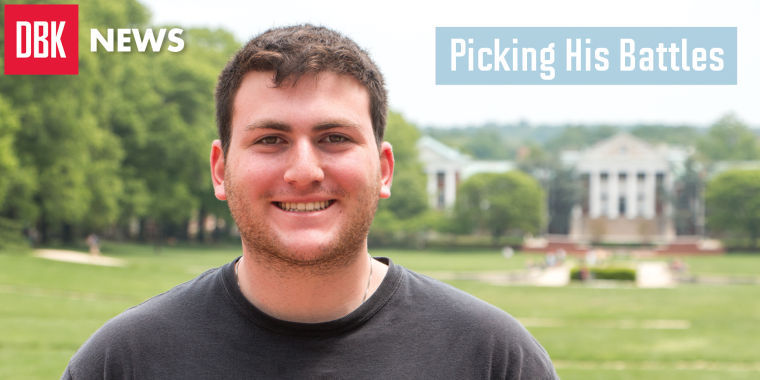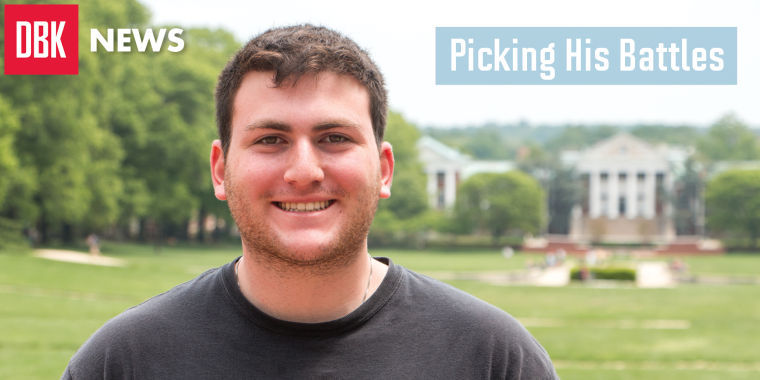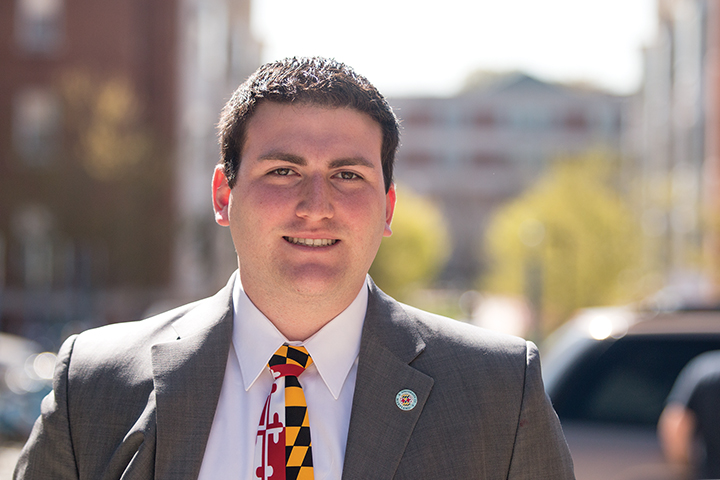Josh Ratner was radiant one week and despondent the next.
On April 14, the junior government and politics major looked and sounded a lot like the student leader from a promotional video a year earlier. In that campaign, Ratner successfully ran for Student Government Association student affairs vice president on Samantha Zwerling’s Go Party ticket. He spoke loudly and energetically — like a politician trying to woo a voter.
But over the weekend of April 18-20, Ratner’s presidential plans for his senior year collapsed. A routine investigation found
Ratner — then the sole candidate running for SGA presidency — ineligible to remain in the governing body he had dedicated his college career to.
During the past month, Ratner has found himself at a crossroads, facing an uncertain future that once seemed its most promising. For most of his adult life, Ratner had been heading toward the SGA presidency. When unopposed, he was set to carry on former two-term SGA President Zwerling’s policies.
“I was surprised, shocked, disappointed,” Ratner said April 23. “I spent the last three years of my life doing this s—.”
As he spoke, Ratner oscillated from resignation to righteous anger, from interlocking his fingers to waving his hands. The appeals process through which he tried to regain his eligibility frustrated him, but it also reminded him of his reasons for pursuing public policy.
One week ago, he was replaced in the student body he expected to lead. Sophomore government and politics major Patrick Ronk and the rest of his Open Party executive board swept unopposed elections and assumed their new positions May 6.
“This was unfair”
On that pivotal April weekend, Ratner stood before three SGA governance board judges to defend himself ad nauseam. Those judges ruled that the body’s elections board did not have the authority to grant Ratner’s appeal, and he was declared ineligible to run for president because his GPA was below the SGA-mandated 2.5.
That requirement violates the Americans with Disabilities Act, Ratner said. Anxiety and attention deficit hyperactivity disorder prevent Ratner from possibly attaining the same grades as other students, he said.
“Because of this arbitrary requirement, I and those like me are prohibited from participating or being heard in the organization,” he said.
In the legislature’s final meeting of the semester April 30, Ratner lost a vote to lower the GPA requirement to 2.0, which the university requires for graduation.
“I had almost no expectation that it was going to pass,” Ratner said May 5, staring at his palms. “I was more trying to make a point that this was unfair and that it really prohibited participation for lots of people at the university.”
Other student groups, such as Greek life organizations, have GPA requirements above 2.0, apparently without violating the ADA. And the GPA requirement that disqualified Ratner was calculated by the university at the end of the fall semester, along with every other student’s.
“I don’t see the problem with the SGA wanting to keep its members at a standard,” said Zwerling, a senior environmental science and policy major. “A lot of people in the organization are wondering why, if this is such a huge inclusiveness issue and fairness issue, why hasn’t Josh brought this up before? Josh has been in the organization longer than I have.”
In response to Ratner’s concerns, SGA executives clarified that the organization’s bylaws don’t exclude members with GPAs below 2.5 unless they are serving in elected or appointed positions. And executives plan to establish an ad hoc committee that will work to make the association more inclusive.
“Through this process, we have definitely seen ways that we need to clean up our bylaws and be a lot more explicit about what would happen in a scenario like this,” Zwerling said.
Zwerling said this process has not happened “in recent history,” and she expects the new administration to alter GPA checks to ensure a similar situation does not happen in the future.
“It seems as more of a wall to getting in than a gate to keep bad people out,” Ratner said. “I don’t think I’m unqualified to do the job. There’s nothing that having a 2.5 GPA would do that would make me a better president.”
“It’s a difficult pill to swallow”
On April 23, Ratner stared at the wooden table in the floor lounge of his South Campus Commons apartment. His short black hair was unkempt, and he rocked back and forth on a bench with his arms crossed as he spoke in a low, sometimes breaking voice. He did not smile.
“It’s a difficult pill to swallow, knowing that I’ve dedicated the last three years of my life to serving the student body and working as part of the SGA, and suddenly it’s all taken away,” Ratner said. “There was a day I didn’t get out of bed, and there was a day when I had so much stuff to do associated with this that I didn’t have a second to stop moving. I’m lucky to have such great support systems with my girlfriend and my friends and colleagues, friends on the ticket as well who have been supportive throughout this. That’s made it bearable, and I’ve been functional.”
Ratner has considered filing a discrimination case against the SGA through the university’s diversity and compliance office because of the GPA requirement. That could force the SGA to remove the requirement, he said, but it could also lead to nothing.
“I don’t want to hurt the organization,” Ratner said Sunday. “I’m still trying to find the balance of potential harm it could do to the organization versus what it could mean for students with disabilities and other issues on campus.”
Zwerling said the possibility of bringing outside administration into the SGA over this requirement concerns her. Ratner said he won’t make a decision about any discrimination case until after this semester.
Though he called his failed appeal process “the largest personal disappointment I’ve experienced,” Ratner plans to help the SGA in any way he can, and he continues to work with the SGA and other organizations. He doesn’t want to dwell on the past, he said.
“I don’t have any regrets. I think I did the right thing throughout,” Ratner said. “I still think that the governance board grossly mishandled the case. I think they were very unprofessional about how it was handled. I don’t think they asked the right questions during the trial. I disagree with a lot of the premises in their verdict. But it happened, so what am I going to do?”
“You need to address personal problems”
On April 14, before he was disqualified from the presidential campaign, Ratner sat down in his floor lounge. Wearing a flapping red T-shirt, huge Maryland flag athletic shorts and flip-flops, he smiled widely and talked freely. A sticker on his MacBook case showed Homer Simpson taking a bite out of the Apple logo.
Ratner’s confident words and beaming face projected only optimism about his political prospects in a body that represents more than 26,000 undergraduate students and budgets millions of dollars in student fees.
“Some of my goals include bringing tailgating back onto campus, auditing and improving the Health Center, and increasing public safety both on- and off-campus,” he said in the April 2013 promotional video for his campaign for student affairs vice president.
Ratner, with the help of the University Senate, in which he was an undergraduate senator; the College Park City Council, for which he was last year’s student liaison; and the SGA; achieved those goals and others over the past few years.
“I love public service,” he said. “I love community service. I come from a very well-off area, and I’ve been to lots of not-so-well-off areas, and kind of seeing everything I have and the fact that lots of people don’t have, that really made me passionate about policy and trying to kind of bring people up and empowering them to be able to succeed.”
When he still had a platform, his main focus was improving the SGA’s human relations capacities by expanding the chief of staff’s office and creating a safe place for members to discuss issues.
“Leading people is much more complicated than the task at hand,” Ratner said. “You need to address personal problems before you can do anything.”
“I’ve had times where I haven’t gotten out of bed for a week”
Ratner was diagnosed with ADHD and an anxiety disorder about a year after he entered college. The experience inspired him to get involved in the mental health issues he later championed in the SGA.
Sometimes he calls the diagnosis “differently abled.” He can use the ping-pong nature of his thoughts to devise solutions others hadn’t, he said, and he can dive into new topics often.
“If there’s a problem, Josh will throw out, like, a million ideas about how to fix it,” Zwerling said.
Ratner told her he was voted “Most Likely to Come Up with an Idea” in high school.
“I still see it as a disability,” Ratner said. “There’s still things that are difficult to do and work on.”
Part of the disability is the stigma.
“People are all, ‘I’m so ADD,’” he said. “It can be really debilitating, and people don’t realize how it affects people. I’ve had times where I haven’t gotten out of bed for a week.”
Denise and Sandy Ratner, Josh’s parents, said Josh’s diagnoses have rerouted his life’s trajectory.
“It’s affected his academics; it’s affected his life; it’s affected everything,” said Sandy Ratner, a pulmonologist in Great Neck, New York. “It’s been hard. He’s definitely struggled. He’s a big kid — I know he’s going to do well; I know he’s going to succeed. But it’s definitely made it really hard for him, hard for us.”
“Most policies aren’t as life-and-death”
When Hurricane Sandy struck New York, Josh Ratner went back to his Long Island hometown to help repair the damage with the volunteer firefighters there.
He works as a volunteer firefighter in College Park too. He has seen someone get shot, delivered babies and watched a family friend die of cardiac arrest.
“It’s tough on people,” Ratner said. “But the benefits and the pleasure I get from helping others outweighs the negative psychological aspects of what happens.”
Volunteering with those emergency services has given Ratner invaluable perspective, he said.
“Luckily, most policy decisions aren’t as life-and-death as ones in that circumstance,” he said.
Ratner knows he must wholly invest himself in each new patient, then disconnect and prepare for the next one. Lately, he has thought about his ineligibility process in much the same way: As soon as the call is over, it’s time to drop it.
“I’m moving on”
Ratner is focusing on what he can change.
There are things he can’t: the governance board’s decision, his ADHD and anxiety diagnoses, executives’ point of view on the 2.5 GPA requirement, the induction of an SGA legislative board that does not include him.
But there are things he hopes to change in the future: working with more nonprofits, increasing mental health awareness on college campuses, improving the workings of the SGA, planning for the university’s transition to the Big Ten.
“Right now, I’m just focusing on me and making sure I take care of everything I need to personally before I step back into the kind of work I was doing before,” he said.
He smiled as he talked about the fulfillment he feels through volunteerism and went through a mental checklist of his accomplishments over the past few years. His smile faded as he spoke about advocating mental health issues and the misunderstandings surrounding them.
“For every failure like this, there’s 10 successes, so it’s OK,” he said. “I’m moving on, doing more, keeping on pushing.”
The more he focused on what he could change, the more he became the radiant man from mid-April, even if only briefly.
“It’s not about winning,” Ratner said. “It’s not about the position. It’s what you can do for the university, for the organization. And I think there’s still a lot that I can do.”





